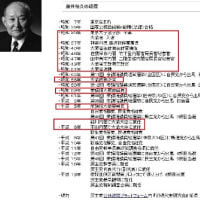■■ニューヨークタイムズ社説全文引用(ここからの続き←クリック)■■
(The Civil War)
One of Mr. Bush’s arguments against withdrawal is that it would lead to civil war. That war is raging, right now, and it may take years to burn out. Iraq may fragment into separate Kurdish, Sunni and Shiite republics, and American troops are not going to stop that from happening.
It is possible, we suppose, that announcing a firm withdrawal date might finally focus Iraq’s political leaders and neighboring governments on reality. Ideally, it could spur Iraqi politicians to take the steps toward national reconciliation that they have endlessly discussed but refused to act on.
But it is foolish to count on that, as some Democratic proponents of withdrawal have done. The administration should use whatever leverage it gains from withdrawing to press its allies and Iraq’s neighbors to help achieve a negotiated solution.
Iraq’s leaders — knowing that they can no longer rely on the Americans to guarantee their survival — might be more open to compromise, perhaps to a Bosnian-style partition, with economic resources fairly shared but with millions of Iraqis forced to relocate. That would be better than the slow-motion ethnic and religious cleansing that has contributed to driving one in seven Iraqis from their homes.
The United States military cannot solve the problem. Congress and the White House must lead an international attempt at a negotiated outcome. To start, Washington must turn to the United Nations, which Mr. Bush spurned and ridiculed as a preface to war.
(The Human Crisis)
There are already nearly two million Iraqi refugees, mostly in Syria and Jordan, and nearly two million more Iraqis who have been displaced within their country. Without the active cooperation of all six countries bordering Iraq — Turkey, Iran, Kuwait, Saudi Arabia, Jordan and Syria — and the help of other nations, this disaster could get worse. Beyond the suffering, massive flows of refugees — some with ethnic and political resentments — could spread Iraq’s conflict far beyond Iraq’s borders.
Kuwait and Saudi Arabia must share the burden of hosting refugees. Jordan and Syria, now nearly overwhelmed with refugees, need more international help. That, of course, means money. The nations of Europe and Asia have a stake and should contribute. The United States will have to pay a large share of the costs, but should also lead international efforts, perhaps a donors’ conference, to raise money for the refugee crisis.
Washington also has to mend fences with allies. There are new governments in Britain, France and Germany that did not participate in the fight over starting this war and are eager to get beyond it. But that will still require a measure of humility and a commitment to multilateral action that this administration has never shown. And, however angry they were with President Bush for creating this mess, those nations should see that they cannot walk away from the consequences. To put it baldly, terrorism and oil make it impossible to ignore.
The United States has the greatest responsibilities, including the admission of many more refugees for permanent resettlement. The most compelling obligation is to the tens of thousands of Iraqis of courage and good will — translators, embassy employees, reconstruction workers — whose lives will be in danger because they believed the promises and cooperated with the Americans.
(The Neighbors)
One of the trickiest tasks will be avoiding excessive meddling in Iraq by its neighbors — America’s friends as well as its adversaries.
Just as Iran should come under international pressure to allow Shiites in southern Iraq to develop their own independent future, Washington must help persuade Sunni powers like Syria not to intervene on behalf of Sunni Iraqis. Turkey must be kept from sending troops into Kurdish territories.
For this effort to have any remote chance, Mr. Bush must drop his resistance to talking with both Iran and Syria. Britain, France, Russia, China and other nations with influence have a responsibility to help. Civil war in Iraq is a threat to everyone, especially if it spills across Iraq’s borders.
President Bush and Vice President Dick Cheney have used demagoguery and fear to quell Americans’ demands for an end to this war. They say withdrawing will create bloodshed and chaos and encourage terrorists. Actually, all of that has already happened — the result of this unnecessary invasion and the incompetent management of this war.
This country faces a choice. We can go on allowing Mr. Bush to drag out this war without end or purpose. Or we can insist that American troops are withdrawn as quickly and safely as we can manage — with as much effort as possible to stop the chaos from spreading.
■■引用終了■■
★「憎しみはダークサイドへの道、苦しみと痛みへの道なのじゃ」(マスター・ヨーダ)
★「政策を決めるのはその国の指導者です。そして,国民は,つねにその指導者のいいなりになるように仕向けられます。方法は簡単です。一般的な国民に向かっては,われわれは攻撃されかかっているのだと伝え,戦意を煽ります。平和主義者に対しては,愛国心が欠けていると非難すればいいのです。このやりかたはどんな国でも有効です」(ヒトラーの側近ヘルマン・ゲーリング。ナチスドイツを裁いたニュルンベルグ裁判にて)
※このブログのトップページへはここ←をクリックして下さい。過去記事はENTRY ARCHIVE・過去の記事,分野別で読むにはCATEGORY・カテゴリからそれぞれ選択して下さい。
また,このブログの趣旨の紹介及びTB&コメントの際のお願いはこちら(←クリック)まで。転載、引用大歓迎です。なお、安倍辞任までの間、字数が許す限り、タイトルに安倍辞任要求を盛り込むようにしています(ここ←参照下さい)。
(The Civil War)
One of Mr. Bush’s arguments against withdrawal is that it would lead to civil war. That war is raging, right now, and it may take years to burn out. Iraq may fragment into separate Kurdish, Sunni and Shiite republics, and American troops are not going to stop that from happening.
It is possible, we suppose, that announcing a firm withdrawal date might finally focus Iraq’s political leaders and neighboring governments on reality. Ideally, it could spur Iraqi politicians to take the steps toward national reconciliation that they have endlessly discussed but refused to act on.
But it is foolish to count on that, as some Democratic proponents of withdrawal have done. The administration should use whatever leverage it gains from withdrawing to press its allies and Iraq’s neighbors to help achieve a negotiated solution.
Iraq’s leaders — knowing that they can no longer rely on the Americans to guarantee their survival — might be more open to compromise, perhaps to a Bosnian-style partition, with economic resources fairly shared but with millions of Iraqis forced to relocate. That would be better than the slow-motion ethnic and religious cleansing that has contributed to driving one in seven Iraqis from their homes.
The United States military cannot solve the problem. Congress and the White House must lead an international attempt at a negotiated outcome. To start, Washington must turn to the United Nations, which Mr. Bush spurned and ridiculed as a preface to war.
(The Human Crisis)
There are already nearly two million Iraqi refugees, mostly in Syria and Jordan, and nearly two million more Iraqis who have been displaced within their country. Without the active cooperation of all six countries bordering Iraq — Turkey, Iran, Kuwait, Saudi Arabia, Jordan and Syria — and the help of other nations, this disaster could get worse. Beyond the suffering, massive flows of refugees — some with ethnic and political resentments — could spread Iraq’s conflict far beyond Iraq’s borders.
Kuwait and Saudi Arabia must share the burden of hosting refugees. Jordan and Syria, now nearly overwhelmed with refugees, need more international help. That, of course, means money. The nations of Europe and Asia have a stake and should contribute. The United States will have to pay a large share of the costs, but should also lead international efforts, perhaps a donors’ conference, to raise money for the refugee crisis.
Washington also has to mend fences with allies. There are new governments in Britain, France and Germany that did not participate in the fight over starting this war and are eager to get beyond it. But that will still require a measure of humility and a commitment to multilateral action that this administration has never shown. And, however angry they were with President Bush for creating this mess, those nations should see that they cannot walk away from the consequences. To put it baldly, terrorism and oil make it impossible to ignore.
The United States has the greatest responsibilities, including the admission of many more refugees for permanent resettlement. The most compelling obligation is to the tens of thousands of Iraqis of courage and good will — translators, embassy employees, reconstruction workers — whose lives will be in danger because they believed the promises and cooperated with the Americans.
(The Neighbors)
One of the trickiest tasks will be avoiding excessive meddling in Iraq by its neighbors — America’s friends as well as its adversaries.
Just as Iran should come under international pressure to allow Shiites in southern Iraq to develop their own independent future, Washington must help persuade Sunni powers like Syria not to intervene on behalf of Sunni Iraqis. Turkey must be kept from sending troops into Kurdish territories.
For this effort to have any remote chance, Mr. Bush must drop his resistance to talking with both Iran and Syria. Britain, France, Russia, China and other nations with influence have a responsibility to help. Civil war in Iraq is a threat to everyone, especially if it spills across Iraq’s borders.
President Bush and Vice President Dick Cheney have used demagoguery and fear to quell Americans’ demands for an end to this war. They say withdrawing will create bloodshed and chaos and encourage terrorists. Actually, all of that has already happened — the result of this unnecessary invasion and the incompetent management of this war.
This country faces a choice. We can go on allowing Mr. Bush to drag out this war without end or purpose. Or we can insist that American troops are withdrawn as quickly and safely as we can manage — with as much effort as possible to stop the chaos from spreading.
■■引用終了■■
★「憎しみはダークサイドへの道、苦しみと痛みへの道なのじゃ」(マスター・ヨーダ)
★「政策を決めるのはその国の指導者です。そして,国民は,つねにその指導者のいいなりになるように仕向けられます。方法は簡単です。一般的な国民に向かっては,われわれは攻撃されかかっているのだと伝え,戦意を煽ります。平和主義者に対しては,愛国心が欠けていると非難すればいいのです。このやりかたはどんな国でも有効です」(ヒトラーの側近ヘルマン・ゲーリング。ナチスドイツを裁いたニュルンベルグ裁判にて)
※このブログのトップページへはここ←をクリックして下さい。過去記事はENTRY ARCHIVE・過去の記事,分野別で読むにはCATEGORY・カテゴリからそれぞれ選択して下さい。
また,このブログの趣旨の紹介及びTB&コメントの際のお願いはこちら(←クリック)まで。転載、引用大歓迎です。なお、安倍辞任までの間、字数が許す限り、タイトルに安倍辞任要求を盛り込むようにしています(ここ←参照下さい)。














